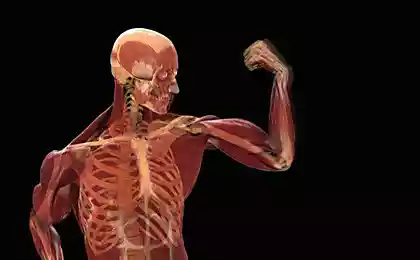792
35 important facts about human habits
The site publishes material Leo Babauty - creator of the popular blog about personal effectiveness ZenHabits.Ya learned all this from their own experience. In the early 2000s, I was trying to overcome their addiction to smoking and beaten several times - only in late 2005, I succeeded. I tried to teach myself to play sports, get rid of the habit of eating bad food, force yourself to wake up early, to become more productive, pay off debt and to simplify my life.
I have often suffered defeats, but precisely because of this defeat, I brought the lessons, which will now tell.

1. When you change something insignificant, your brain quickly gets used to the new norm. move to another country where they speak in an unknown language you where you do no know where unusual you food, customs, quite a different house - it can be very difficult. But one tiny change is not much discomfort. After a month or two you adapt to these small changes, they become part of a familiar life, the new norm.
2. Small changes are easier to arrange. Big changes require more time and effort. If your day is painted on the clock, it is difficult to set aside time for a new habit. Small changes - say, a few push-ups in the morning - much easier to start.
3. Small changes are easier to maintain regularly. If you have decided on a great change (every day going to the gym for half an hour!), Probably in the beginning you will be full of enthusiasm. But gradually the enthusiasm fade, and eventually you may have to drop everything. If you are from the beginning aimed at a very small habit, it is much more likely that it is entrenched.
4. Habits associated with occasions. When there is a reason, run a habit. For example, some people came to work immediately include the computer. And then, probably immediately make some more habitual action. By repetition this connection between the trigger and the habit becomes stronger.
5. Habits that have multiple triggers or include under various conditions, to master difficult. It is much easier to train yourself to meditate every morning upon awakening and absorption glass of water than to get used to doing something that draws 1) to changing conditions (such as an attempt to not to react irritably to criticism - you do not know when this criticism is going to happen), or 2) on several different types of triggers (for example, smoking can be caused by stress, views of other smokers, alcohol, coffee, and so on. d.)
6. First master more simple habits. It is recommend to start with such habits, which require only a couple of minutes a day and tied to some regular events of your day that you seem to be pleasant and uncomplicated. So you build the skill to create new habits, and most importantly - build trust in yourself.
7. Trust in yourself. Before I learned how to effectively vaccinate their new habits, I lacked confidence that I will stick to these new habits. Why?
Because the first of many times I suffered defeat, allowed himself to break promises made to yourself! If someone you are constantly lying, you cease to believe him. Similarly, you cease to believe and imagine. And the solution is the same: to gradually return the trust, relying on small promises and small victories. It takes time. But it is, perhaps, the most important thing you can do.
8. Small changes are transformed into large. When you try to do everything at once, you have less chance of success. If you persist in small change, then in the long run you will see serious changes.
Try very little to change his diet and level of physical activity: a year you will become much healthier. Try to learn something a little bit, and if it becomes a habit, then six months later you have a new business will get much better.
9. It does not matter where you start. I've seen people suffer immensely, trying to choose something; it seems that the order of the changes is important. Of course, it can be optimally first learn to meditate, and then change your diet. But you know that it is not optimal? When there is no change at all. In the long term, if you change yourself a little, you will still learn all important habits. So just take hold of what you like best.
10. The energy and sleep. If you have enough sleep, the fatigue and lack of energy will prevent you to focus on changing habits. When your enthusiasm is high, it's nothing, but when it even a little complicated, you will throw his venture: you do not have enough willpower to overcome even a little discomfort. No sleep will not do.
11. Learn to deal with distractions. One of the most common causes of failure with new habits - this is a temporary change in the daily life: the business trip, a large project that requires work late arrival of the guests, the disease. This means that a trigger that starts the habit does not work (you are sick and do not wake up early in the morning), or you will be so busy that you will have no habits at all.
How to be? Consider this hindrance. Either plan to break the habit, or come up with a new temporary trigger. This ability to anticipate, too, can learn, and it helps to quickly learn new habits.
12. Look ahead and wait for obstacles. In addition to these distractions, you may experience other problems. For example, you decide to give up the sweet, but friends invited you to a birthday party. What will you have? What if there will be sweet? If you are not ready, then you are less likely to stick to your new rule. Think about and be prepared.
13. Keep track of your internal dialogue. We all talk to ourselves. It is not always obvious, but when these inner dialogues are negative ("It's too difficult, why did I force myself to suffer ..."), they can stop all the changes in your life. We need to understand what you are trying to tell yourself and realize that this is not true.
14. Learn to watch your impulses, but not to give them. When you feel the need to smoke, eat a bag of candy, skip a morning jog, put everything on pause, watch yourself - but do not give in to this. Usually the need arises unnoticed and you just satisfy her. But you can follow her and do nothing. You can give yourself a choice. At the moment when you watch them, dig into, remember his strong motivation.
15. Cultivate motivation. You need to want to be healthier, to suffer less, want to provide a good life for their children, to want to help those in need. The desire to look good - not enough effective motivator, and the desire to feel strong and capable of many things - very.
16. Program your feedback. It allows you to stick to habits long enough to take root ... but it may alienate you from the new habit.
In the sugar and drugs powerful feedback loop that helps addiction (habit of pleasure, and the deviation from it causes suffering), but at the sport often this cycle of weak (it is difficult to maintain the habit and shy - nice).
But the change cycle can be, and one of the best ways - responsibility to someone else. If you agree with one another, that you will go for a jog at 6 am, you will hate to miss this run, and vice versa, nice when you still will be selected and chat with others.
17. Challenge yourself. Short-term objectives for 2-6 weeks, very motivated. This can be a collective and joint call (you are with a friend or girlfriend put themselves common task). Examples: no sugar for a month, to do exercises every day for three weeks, six weeks diet and so on. D.
18. Exceptions to provoke an exception. It's easy to say: "One time - no big deal." But it's scary, because now you will find that the exceptions - this is normal. And stop believing their own promises. It is much more efficient to do the exceptions. If you caught yourself thinking about exclusion and trying to justify it, stop and think of their motivation.
19. Habit - it does not work, but the reward. Coming up with the external rewards - a good way to improve the feedback for the development of habits, but the best reward - internal. The award - is the actions themselves. If you think that sports - sucks, you get negative feedback right away and therefore unlikely to be able to stick to its new long habit.
Change your attitude: the habit of a reward in itself, is a way to take care of themselves. Do not think of it as an unpleasant routine - because then you start to avoid it.
20. Just a lot of new habits - it's a failure. Try to experiment and begin immediately to develop 5 new habits. See how it successfully. And then try to only one. In my experience, when a habit is much more effective than when the two of them, and at times better than when they were 5-10.
21. Catch moments when you are distracted. In the beginning, when we have a lot of energy, we focus on a new habit. But then there is something else, is a new toy, and soon the idea to change the habit disappears. With me it was a lot of times. You need to learn to focus on the habit for a short time each day, and continue to enjoy it.
22. Blog - this is very useful. blog - a great way to make yourself accountable to others. Also, when you share what you are doing and what they are learning, you have to comprehend their habit, and then experience the new knowledge becomes much deeper.
23. Failure - a learning process. In their attempts to learn new habits, you'll be sure to take a beating. But instead of seeing it as their personal failure, consider it as a way to learn something about yourself and how to develop new habits.
24. Learn how to continue after the defeat. Many people just give up after the failure. That's why it's so hard to change yourself. If they try again, something has changed, then their chances of success would be increased significantly. People who are able to change ourselves - not those who never fails: the ones who after the defeat continues to move forward.
25. Change or die. Changing habits - this is the ability to adapt. The new work? It will change something, so you have to adapt and their habits. We missed a few days? Find out what it is, and adapts. You do not get pleasure? Find a new way to enjoy the habit.
26. Seek support. To whom do you turn to when things get tough? When you need to have cheered? Find a friend who will support you. It could be your spouse, best friend, mother or father, sister or brother, a colleague. You can find a support group online. It changes a lot.
27. You limit yourself too. Many times I have advised people to give up cheese, sugar, beer, or at least not for long. They answered: "No, I would not be able to give up the cheese!" Well, it is if you believe in it. But I realized that we often think that something impossible, although it is quite possible. If you examine their beliefs and be willing to test it in practice, you will often see that they are wrong.
28. Set the environment for success. If you choose not to have a sweet, discard all sweets, what you have in the house. Ask your spouse to support you, some time not to buy sweet in general. Let your friends, do not eat sweets, and ask them to support you. Look for ways to create an environment where there are more chances of success.
29. Lowers the barrier. often to jog, I think, as hard as long as it's cold outside, and so on. G., I pump up themselves and eventually left the house. But if I set a rule - "Bind up the laces and just go out on the street" - it is so simple that it is hard to say "no" in response. As soon as I close the door behind me, I feel the joy of that began, and then everything is going well.
30. Ask breaks. If you go away on a business trip and you know that there is a habit of support does not work, write down the date of pre-break, and do not wait for the moment when you begin to blame themselves for the failure. And write down the date when you will return to your new habit.
31. Habits situational. If the habit is linked, for example, to the morning soul, the trigger - this is not the shower, and the whole process, the whole environment at this point. If you take a shower in another house or hotel, do not start the habit.
32. Look for other ways to solve the problem. often bad habits - the way to deal with a real problem: stress, wrong attitude to him, a quarrel with a loved one. This problem does not disappear, and the bad habit of turning into a crutch.
33. Be kind to yourself. In-kind to yourself - it is an important skill if you combine it with improving his habits. Remind yourself of how difficult it is to be happy, and that you aspire to happiness, in spite of everything that causes you stress and frustration. It's difficult. Empathy currently. Treat yourself with understanding. This will help.
34. Perfectionism - your enemy. The way forward is more important than perfection. If you do not begin to develop a new habit, because waiting for some ideal circumstances - drop your expectations and just grab the deal.
35. Changing habits - a tool for self-discovery. It can help you learn what motivates you, what you lead the dialogue with them as to justify their actions, what you need, what incentives you are, what your weaknesses, and so on. d.
Within a few months a change of habits you can learn about yourself more than ten years of life. In this sense, the change of habits - in itself a great reward.
via ideanomics.ru/?p=1911
I have often suffered defeats, but precisely because of this defeat, I brought the lessons, which will now tell.

1. When you change something insignificant, your brain quickly gets used to the new norm. move to another country where they speak in an unknown language you where you do no know where unusual you food, customs, quite a different house - it can be very difficult. But one tiny change is not much discomfort. After a month or two you adapt to these small changes, they become part of a familiar life, the new norm.
2. Small changes are easier to arrange. Big changes require more time and effort. If your day is painted on the clock, it is difficult to set aside time for a new habit. Small changes - say, a few push-ups in the morning - much easier to start.
3. Small changes are easier to maintain regularly. If you have decided on a great change (every day going to the gym for half an hour!), Probably in the beginning you will be full of enthusiasm. But gradually the enthusiasm fade, and eventually you may have to drop everything. If you are from the beginning aimed at a very small habit, it is much more likely that it is entrenched.
4. Habits associated with occasions. When there is a reason, run a habit. For example, some people came to work immediately include the computer. And then, probably immediately make some more habitual action. By repetition this connection between the trigger and the habit becomes stronger.
5. Habits that have multiple triggers or include under various conditions, to master difficult. It is much easier to train yourself to meditate every morning upon awakening and absorption glass of water than to get used to doing something that draws 1) to changing conditions (such as an attempt to not to react irritably to criticism - you do not know when this criticism is going to happen), or 2) on several different types of triggers (for example, smoking can be caused by stress, views of other smokers, alcohol, coffee, and so on. d.)
6. First master more simple habits. It is recommend to start with such habits, which require only a couple of minutes a day and tied to some regular events of your day that you seem to be pleasant and uncomplicated. So you build the skill to create new habits, and most importantly - build trust in yourself.
7. Trust in yourself. Before I learned how to effectively vaccinate their new habits, I lacked confidence that I will stick to these new habits. Why?
Because the first of many times I suffered defeat, allowed himself to break promises made to yourself! If someone you are constantly lying, you cease to believe him. Similarly, you cease to believe and imagine. And the solution is the same: to gradually return the trust, relying on small promises and small victories. It takes time. But it is, perhaps, the most important thing you can do.
8. Small changes are transformed into large. When you try to do everything at once, you have less chance of success. If you persist in small change, then in the long run you will see serious changes.
Try very little to change his diet and level of physical activity: a year you will become much healthier. Try to learn something a little bit, and if it becomes a habit, then six months later you have a new business will get much better.
9. It does not matter where you start. I've seen people suffer immensely, trying to choose something; it seems that the order of the changes is important. Of course, it can be optimally first learn to meditate, and then change your diet. But you know that it is not optimal? When there is no change at all. In the long term, if you change yourself a little, you will still learn all important habits. So just take hold of what you like best.
10. The energy and sleep. If you have enough sleep, the fatigue and lack of energy will prevent you to focus on changing habits. When your enthusiasm is high, it's nothing, but when it even a little complicated, you will throw his venture: you do not have enough willpower to overcome even a little discomfort. No sleep will not do.
11. Learn to deal with distractions. One of the most common causes of failure with new habits - this is a temporary change in the daily life: the business trip, a large project that requires work late arrival of the guests, the disease. This means that a trigger that starts the habit does not work (you are sick and do not wake up early in the morning), or you will be so busy that you will have no habits at all.
How to be? Consider this hindrance. Either plan to break the habit, or come up with a new temporary trigger. This ability to anticipate, too, can learn, and it helps to quickly learn new habits.
12. Look ahead and wait for obstacles. In addition to these distractions, you may experience other problems. For example, you decide to give up the sweet, but friends invited you to a birthday party. What will you have? What if there will be sweet? If you are not ready, then you are less likely to stick to your new rule. Think about and be prepared.
13. Keep track of your internal dialogue. We all talk to ourselves. It is not always obvious, but when these inner dialogues are negative ("It's too difficult, why did I force myself to suffer ..."), they can stop all the changes in your life. We need to understand what you are trying to tell yourself and realize that this is not true.
14. Learn to watch your impulses, but not to give them. When you feel the need to smoke, eat a bag of candy, skip a morning jog, put everything on pause, watch yourself - but do not give in to this. Usually the need arises unnoticed and you just satisfy her. But you can follow her and do nothing. You can give yourself a choice. At the moment when you watch them, dig into, remember his strong motivation.
15. Cultivate motivation. You need to want to be healthier, to suffer less, want to provide a good life for their children, to want to help those in need. The desire to look good - not enough effective motivator, and the desire to feel strong and capable of many things - very.
16. Program your feedback. It allows you to stick to habits long enough to take root ... but it may alienate you from the new habit.
In the sugar and drugs powerful feedback loop that helps addiction (habit of pleasure, and the deviation from it causes suffering), but at the sport often this cycle of weak (it is difficult to maintain the habit and shy - nice).
But the change cycle can be, and one of the best ways - responsibility to someone else. If you agree with one another, that you will go for a jog at 6 am, you will hate to miss this run, and vice versa, nice when you still will be selected and chat with others.
17. Challenge yourself. Short-term objectives for 2-6 weeks, very motivated. This can be a collective and joint call (you are with a friend or girlfriend put themselves common task). Examples: no sugar for a month, to do exercises every day for three weeks, six weeks diet and so on. D.
18. Exceptions to provoke an exception. It's easy to say: "One time - no big deal." But it's scary, because now you will find that the exceptions - this is normal. And stop believing their own promises. It is much more efficient to do the exceptions. If you caught yourself thinking about exclusion and trying to justify it, stop and think of their motivation.
19. Habit - it does not work, but the reward. Coming up with the external rewards - a good way to improve the feedback for the development of habits, but the best reward - internal. The award - is the actions themselves. If you think that sports - sucks, you get negative feedback right away and therefore unlikely to be able to stick to its new long habit.
Change your attitude: the habit of a reward in itself, is a way to take care of themselves. Do not think of it as an unpleasant routine - because then you start to avoid it.
20. Just a lot of new habits - it's a failure. Try to experiment and begin immediately to develop 5 new habits. See how it successfully. And then try to only one. In my experience, when a habit is much more effective than when the two of them, and at times better than when they were 5-10.
21. Catch moments when you are distracted. In the beginning, when we have a lot of energy, we focus on a new habit. But then there is something else, is a new toy, and soon the idea to change the habit disappears. With me it was a lot of times. You need to learn to focus on the habit for a short time each day, and continue to enjoy it.
22. Blog - this is very useful. blog - a great way to make yourself accountable to others. Also, when you share what you are doing and what they are learning, you have to comprehend their habit, and then experience the new knowledge becomes much deeper.
23. Failure - a learning process. In their attempts to learn new habits, you'll be sure to take a beating. But instead of seeing it as their personal failure, consider it as a way to learn something about yourself and how to develop new habits.
24. Learn how to continue after the defeat. Many people just give up after the failure. That's why it's so hard to change yourself. If they try again, something has changed, then their chances of success would be increased significantly. People who are able to change ourselves - not those who never fails: the ones who after the defeat continues to move forward.
25. Change or die. Changing habits - this is the ability to adapt. The new work? It will change something, so you have to adapt and their habits. We missed a few days? Find out what it is, and adapts. You do not get pleasure? Find a new way to enjoy the habit.
26. Seek support. To whom do you turn to when things get tough? When you need to have cheered? Find a friend who will support you. It could be your spouse, best friend, mother or father, sister or brother, a colleague. You can find a support group online. It changes a lot.
27. You limit yourself too. Many times I have advised people to give up cheese, sugar, beer, or at least not for long. They answered: "No, I would not be able to give up the cheese!" Well, it is if you believe in it. But I realized that we often think that something impossible, although it is quite possible. If you examine their beliefs and be willing to test it in practice, you will often see that they are wrong.
28. Set the environment for success. If you choose not to have a sweet, discard all sweets, what you have in the house. Ask your spouse to support you, some time not to buy sweet in general. Let your friends, do not eat sweets, and ask them to support you. Look for ways to create an environment where there are more chances of success.
29. Lowers the barrier. often to jog, I think, as hard as long as it's cold outside, and so on. G., I pump up themselves and eventually left the house. But if I set a rule - "Bind up the laces and just go out on the street" - it is so simple that it is hard to say "no" in response. As soon as I close the door behind me, I feel the joy of that began, and then everything is going well.
30. Ask breaks. If you go away on a business trip and you know that there is a habit of support does not work, write down the date of pre-break, and do not wait for the moment when you begin to blame themselves for the failure. And write down the date when you will return to your new habit.
31. Habits situational. If the habit is linked, for example, to the morning soul, the trigger - this is not the shower, and the whole process, the whole environment at this point. If you take a shower in another house or hotel, do not start the habit.
32. Look for other ways to solve the problem. often bad habits - the way to deal with a real problem: stress, wrong attitude to him, a quarrel with a loved one. This problem does not disappear, and the bad habit of turning into a crutch.
33. Be kind to yourself. In-kind to yourself - it is an important skill if you combine it with improving his habits. Remind yourself of how difficult it is to be happy, and that you aspire to happiness, in spite of everything that causes you stress and frustration. It's difficult. Empathy currently. Treat yourself with understanding. This will help.
34. Perfectionism - your enemy. The way forward is more important than perfection. If you do not begin to develop a new habit, because waiting for some ideal circumstances - drop your expectations and just grab the deal.
35. Changing habits - a tool for self-discovery. It can help you learn what motivates you, what you lead the dialogue with them as to justify their actions, what you need, what incentives you are, what your weaknesses, and so on. d.
Within a few months a change of habits you can learn about yourself more than ten years of life. In this sense, the change of habits - in itself a great reward.
via ideanomics.ru/?p=1911
9 facts about why the brand names are used in these figures
The man bought the rights to vital medicines and raised the price to 13, $ 5 to $ 750























